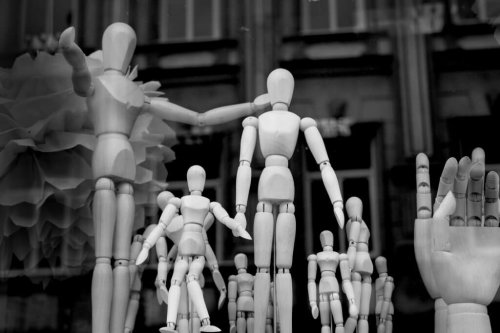The Three N's of Radicalization

We understand radicalization as a social and psychological process that creates a growing commitment to an extremist political or religious ideology. In other words, to radicalize means to adopt political or religious beliefs that most people don’t share. How does radicalization happen?
There are three psychological forces whose combination can explain radicalization. These form the three N’s of radicalization. The first of these forces is related to needs, or the shortcomings in our lives. These shortcomings can motivate us to do something in order to get something we were missing. The second force is narrative. A narrative provides beliefs that define the world and establish how we behave. The last force is our social network or the people around us.
Three cases of radicalization
Maria has an unconditional love for animals and can’t bear animal cruelty. She’s interested in several animal rights groups but hears that they don’t have much of an impact. One day, she feels inspired to become involved in political action, so she joins an environmental group and eventually falls in love with its leader.
Maria’s thinking becomes more and more extreme, to the point that she’d now do anything to protect animal life. Along with the rest of the group, Maria now sabotages the government, investigations, and industrial facilities that she believes violate animal rights.

From a very young age, Vicente has been interested in philosophy and socio-political issues. Some people tell him about an international social protest movement that takes place in big cities around the world. He joins the movement with some friends. Weeks later, during one of the protests, the police arrest Vicente and his friends for throwing stones at officers who were stopping protestors.
On a sunny January morning, Abu crosses the Turkish border into ISIS territory. He feels that he has nothing to lose. He recently got divorced from his wife and is struggling with an addiction to alcohol and cigarettes. Abu is out of shape and definitely not fit to fight, but the prospect of a desk job with ISIS in the caliphate means he could clean his “sinful life” and become a good Muslim.
The radicalization of needs
For radicalization to occur, a need must appear. Scientists have identified this need as the search for importance. People want to make a difference, be important, be someone. In this way, when an opportunity to gain importance appears, when it’s lost or when it’s threatened, people begin their search for meaning. However, people can gain importance in many non-violent ways.
In our examples, Maria has lost importance as she begins to feel helpless in the face of animal abuse. In the other case, Vicente tries not to lose his importance when his friends join the movement, so he joins the movement too. Finally, in Abu’s story, he seeks to gain importance with a job in ISIS.
The radicalization of narrative
As we search for importance, we may come to find that a person’s narrative or ideology is violent. Of all the options people consider to gain importance, the first is violence. In order to commit violent acts, we have to legitimize violence in our beliefs. If our ideology doesn’t allow violence, we’ll search for other means to achieve importance and radicalization won’t occur.
In our examples, Maria radicalizes her thinking after joining the group. She accepts that violence is the only way to defend animals. The movement that Vicente joins is OK with doing illegal things in order to achieve social justice, which he ends up accepting. Lastly, for Abu, ISIS’ ideology allows violence in order to establish an Islamist caliphate.

The radicalization of our social network
Finally, something that the three characters in our examples share is that they’re not alone. To be important, other people have to make you feel important. A group is what makes people feel important. Therefore, the last radicalization ingredient is a social network. In most cases, people become radicalized alongside other people.
Marie fell in love with a radicalized group. Vicente became radicalized with his friends and Abu joined a terrorist organization. Each one radicalized in a different way, but they all have something in common. All of them wanted to be important. They ended up accepting a narrative that justified violence and had a group that accompanied them in that radicalization.
We understand radicalization as a social and psychological process that creates a growing commitment to an extremist political or religious ideology. In other words, to radicalize means to adopt political or religious beliefs that most people don’t share. How does radicalization happen?
There are three psychological forces whose combination can explain radicalization. These form the three N’s of radicalization. The first of these forces is related to needs, or the shortcomings in our lives. These shortcomings can motivate us to do something in order to get something we were missing. The second force is narrative. A narrative provides beliefs that define the world and establish how we behave. The last force is our social network or the people around us.
Three cases of radicalization
Maria has an unconditional love for animals and can’t bear animal cruelty. She’s interested in several animal rights groups but hears that they don’t have much of an impact. One day, she feels inspired to become involved in political action, so she joins an environmental group and eventually falls in love with its leader.
Maria’s thinking becomes more and more extreme, to the point that she’d now do anything to protect animal life. Along with the rest of the group, Maria now sabotages the government, investigations, and industrial facilities that she believes violate animal rights.

From a very young age, Vicente has been interested in philosophy and socio-political issues. Some people tell him about an international social protest movement that takes place in big cities around the world. He joins the movement with some friends. Weeks later, during one of the protests, the police arrest Vicente and his friends for throwing stones at officers who were stopping protestors.
On a sunny January morning, Abu crosses the Turkish border into ISIS territory. He feels that he has nothing to lose. He recently got divorced from his wife and is struggling with an addiction to alcohol and cigarettes. Abu is out of shape and definitely not fit to fight, but the prospect of a desk job with ISIS in the caliphate means he could clean his “sinful life” and become a good Muslim.
The radicalization of needs
For radicalization to occur, a need must appear. Scientists have identified this need as the search for importance. People want to make a difference, be important, be someone. In this way, when an opportunity to gain importance appears, when it’s lost or when it’s threatened, people begin their search for meaning. However, people can gain importance in many non-violent ways.
In our examples, Maria has lost importance as she begins to feel helpless in the face of animal abuse. In the other case, Vicente tries not to lose his importance when his friends join the movement, so he joins the movement too. Finally, in Abu’s story, he seeks to gain importance with a job in ISIS.
The radicalization of narrative
As we search for importance, we may come to find that a person’s narrative or ideology is violent. Of all the options people consider to gain importance, the first is violence. In order to commit violent acts, we have to legitimize violence in our beliefs. If our ideology doesn’t allow violence, we’ll search for other means to achieve importance and radicalization won’t occur.
In our examples, Maria radicalizes her thinking after joining the group. She accepts that violence is the only way to defend animals. The movement that Vicente joins is OK with doing illegal things in order to achieve social justice, which he ends up accepting. Lastly, for Abu, ISIS’ ideology allows violence in order to establish an Islamist caliphate.

The radicalization of our social network
Finally, something that the three characters in our examples share is that they’re not alone. To be important, other people have to make you feel important. A group is what makes people feel important. Therefore, the last radicalization ingredient is a social network. In most cases, people become radicalized alongside other people.
Marie fell in love with a radicalized group. Vicente became radicalized with his friends and Abu joined a terrorist organization. Each one radicalized in a different way, but they all have something in common. All of them wanted to be important. They ended up accepting a narrative that justified violence and had a group that accompanied them in that radicalization.
This text is provided for informational purposes only and does not replace consultation with a professional. If in doubt, consult your specialist.







